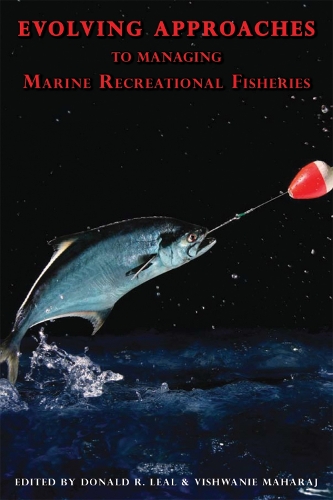
Evolving Approaches to Managing Marine Recreational Fisheries
(Paperback)
Publishing Details
Evolving Approaches to Managing Marine Recreational Fisheries
By (Author) Donald R. Leal
Edited by Vishwanie Maharaj
Contributions by Ragnar Arnason
Contributions by Keith R. Criddle
Contributions by Wade L. Griffin
Contributions by Susan S. Hanna
Contributions by Daniel S. Holland
Contributions by Robert J. Johnston
Contributions by Hwa Nyeon Kim
Contributions by Peter H. Pearse
Bloomsbury Publishing PLC
Lexington Books
23rd October 2008
United States
Classifications
Professional and Scholarly
Non Fiction
Wildlife: aquatic creatures: general interest
Fishing, angling
338.4779916
Physical Properties
Paperback
262
Width 155mm, Height 229mm, Spine 19mm
399g
Description
Each year, thirteen million anglers enjoy the sport of saltwater angling in the United States, generating an estimated $30 billion in sales and supporting nearly 350,000 jobs. Recreational saltwater fishing, however, can significantly impact species of concern-species overfished or experiencing overfishing. Traditional angling controlsbag and size limits and restricted seasonshave fallen short in controlling fishing impacts and reducing conflicts among fishing and non-fishing interests.
Evolving Approaches to Managing Marine Recreational Fisheries offers ways of overcoming such problems while providing anglers and the recreational service industry greater regulatory flexibility to enjoy the fruits of sportfishing. It features fourteen internationally recognized fishery experts presenting the pros and cons of using individual fishing quotas (IFQs), game tags, and angler management organizations (AMOs) in managing marine recreational fisheries, presenting both theoretical and practical solutions to help move recreational fisheries management to a new and improved level.
Reviews
Here at last is a collection of workable solutions to the vexing problem of allocating the rights to recreational fishing: the remaining untamed threat to fish stocks. While the grand masters of rights allocationArnason, Pearse, and Lealare here, the excitement arises from the large number of new analysts who have been attracted to this policy conundrum. This is a must read for the genuinely engaged regulator. -- Michael Walker, Fraser Institute, Canada
With a blend of common sense and innovative ideas, this book should serve as food for thought for managers of our coastal fisheries and the angling community. Looking to the future, traditional fishery management only means more of the sameclosed seasons, restrictive size limits, rapidly shrinking bag limits, and dissatisfaction among recreational anglers. The market-based reforms discussed in Evolving Approaches offer some enlightened alternatives that have the potential to yield both healthy fisheries and happy anglers. -- Brian Yablonski, Florida Fish and Wildlife Conservation Commission
This collection of chapters demonstrates that lessons learned from rights-based systems in commercial fisheries can be beneficially applied to the management of recreational fisheries. This book offers an excellent mix of theoretical and applied works that will be valuable reading on the frontiers of recreational fisheries management for both the participant and professional. -- Lee G. Anderson, University of Delaware
Leal and Maharaj have brought together an impressive assembly of economists that have dealt with property rights in commercial fisheries and asked them to apply their expertise to recreational fisheries and their interaction with commercial fisheries. The result is a highly readable and thought-provoking book that no one who takes an interest in this issue should miss. -- Rgnvaldur Hannesson, Norweigan School of Economics and Business Administration
Author Bio
Donald R. Leal is a senior fellow and Research Director for the Property and Environment Research Center (PERC).
Vishwanie Maharaj is an economist in the Gulf Oceans Program for the Environmental Defense Fund.
